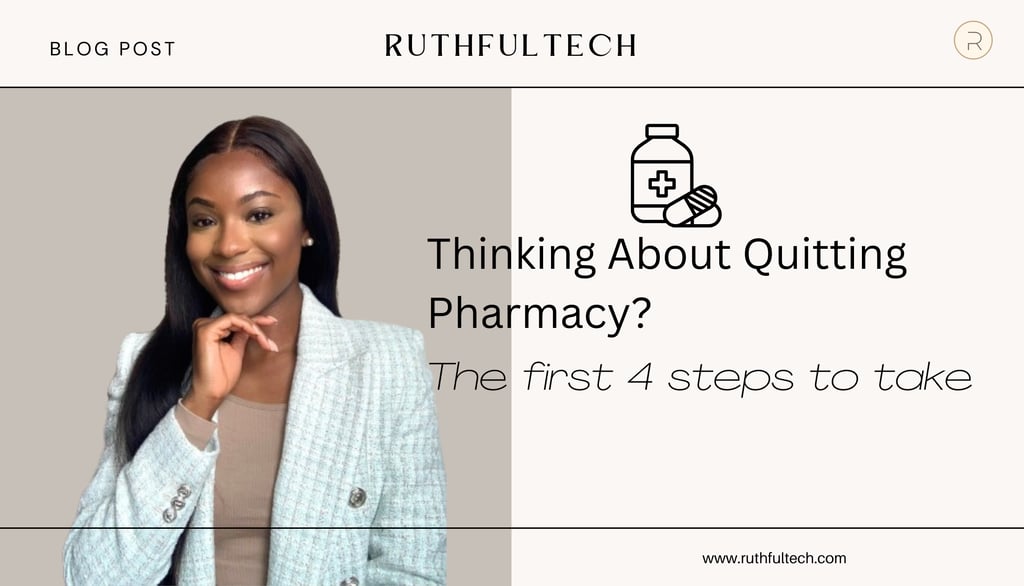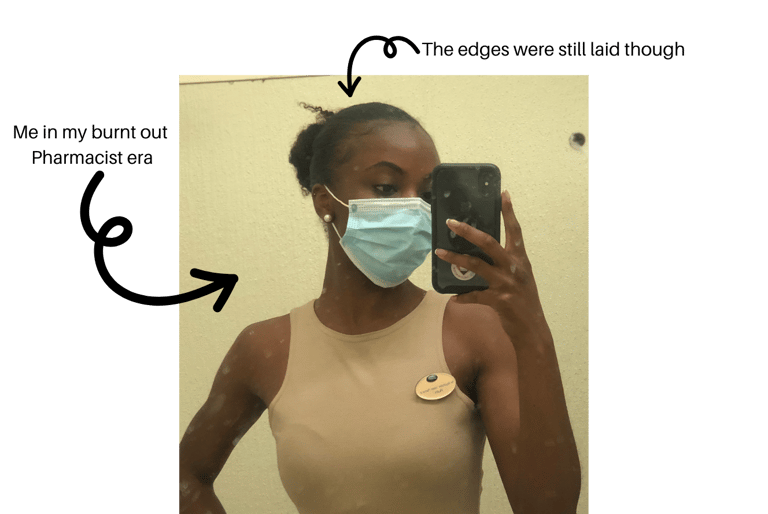Thinking About Quitting Pharmacy?
4 first steps to take
MINDSETPHARMACYCAREER SWITCHING TIPSCAREER
11/25/20243 min read


Two years ago, I was a burnt-out pharmacist, dreading each workday. Today, I’m a software engineer working at a top-tier investment bank—and enjoying it! If someone had told me two years ago that I’d be in finance and tech, I probably would’ve laughed (and told them to put down whatever they were drinking). The transition felt impossible at the time, especially coming from a highly structured healthcare field. But here I am!


When you’re in a vocational career like Pharmacy, the thought of switching can seem far-fetched. It’s easy to get tunnel vision when there’s such a traditional path set out. So, how can healthcare professionals break out of this mindset, take control of their careers, and explore what really excites them?
Let's dive into that:
(side note, this can apply to any career)
1. Before You Leave, Work on Your Mindset
A lot of people feel miserable in their jobs and think a career change will fix everything. But if you don’t work on your mindset, you’ll likely carry the same frustrations into any new role. Sometimes we need to put our adult panties on and acknowledge that we are the problem, not our jobs. So to prevent you from floating from career to career wondering why you're miserable in each, I encourage you to do this one thing. Cultivate gratitude, find moments of joy in your current role BEFORE you think about moving. When we’re exhausted or burned out, we’re not in the best position to make major life choices (I can attest to this!).
You might think you want to switch careers when really, you just need a break, or maybe a conversation with your manager about communication styles, or even just a move to a different company.
To start shifting your mindset, try journaling. At the end of each workday, jot down things you’re grateful for. For me, it was small but meaningful moments—like when a patient would thank me for a successful medical intervention or when I’d have a nice chat with a regular patient.
2. Do Some Soul-Searching
Take time to figure out what you actually want to do—this won’t happen overnight. Start paying attention to what you enjoy, the moments when you feel “in the zone,” and the people you admire. Reflect on why you feel drawn to these things and try to do it independently of others’ opinions. In times of change, people can unintentionally project their fears onto you, so protect your vision. Try solo travelling or having a solo staycation for a few days where you can be alone with your thoughts.
3. Build Skills and Gain Experience
If you’re serious about switching careers, start building relevant skills. The best thing about being alive in these times is that we have a bank of resources available on the Internet where we can learn almost anything. A lot of these are free however, I have found that when I pay for something, I am more likely to be committed to finishing - knowing that you've put money into something can be a big motivator. Be honest with yourself along the way—if something doesn’t resonate, don’t force it. The goal isn’t to convince yourself to like something; it’s about finding what genuinely excites you.
If possible, start building a portfolio or volunteer to gain hands-on experience. This is especially valuable in fields like tech, where showcasing your work matters.
4. Get Real about Job Hunting
Job hunting is a job in itself - it takes time to customise applications, tailor cover letters, and schedule interviews (which are normally done during the work day). As healthcare professionals, we’re used to long, often inflexible hours, which makes job searching especially challenging. Personally, I solved this by working as a locum pharmacist, which gave me the flexibility to choose my workdays and earn a higher rate. This allowed me to take days off to study for my coding bootcamp or to go to interviews when I needed to.
Switching careers while in healthcare has it's advantages—use them to your benefit!
So here are the first 4 steps you should be taking.
I look forward to hearing about the rest of your journey.
Until then,
Ruth
If you enjoyed this post, you'll like:
Reflecting on my first year as a software engineer after leaving Pharmacy


